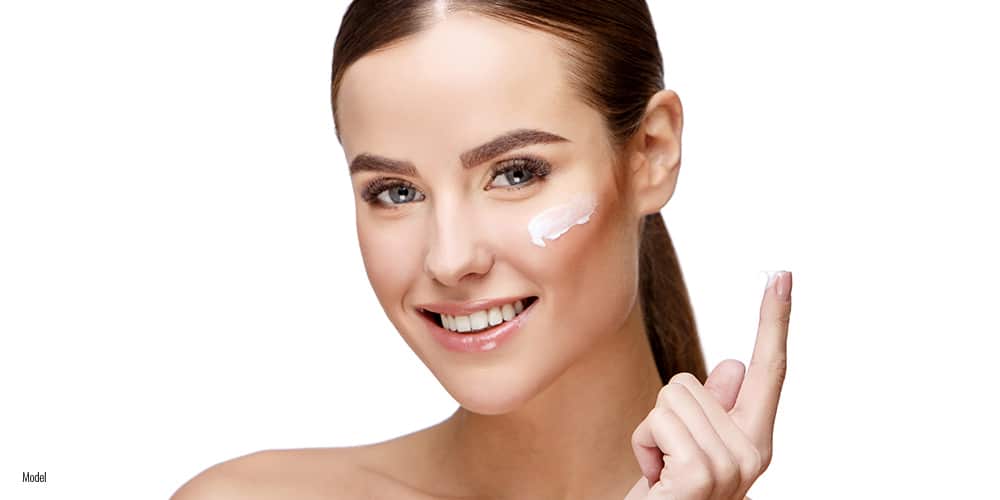January 15, 2025 | 4 minute read

Wearing sunscreen daily is one of the best ways to protect your skin from harmful UV rays, which helps prevent skin cancer. We recommend daily usage of sunscreen with an SPF (sun protection factor) of 30 or higher as a regular part of your skincare routine. This helps prevent sunburns, sun damage, and premature aging. Keep reading to learn why sunscreen is so important, even when it’s cloudy outside.
How Sunlight Is Harmful for Your Skin
Sure, being in the sun is beneficial. Your body needs it to produce vitamin D, which is essential to your health. It also improves serotonin levels in the brain to boost mood and mental health. However, sunlight exposure can also be dangerous for your skin.
Frequent sunlight exposure over the years results in damage to the cells in the skin. The DNA changes on a cellular level, accumulating damage. Long-term exposure over the course of your lifetime leaves its effect.
UV radiation, which is what’s in sunlight, breaks down the collagen and elastin fibers in the skin. These connective tissues are what make skin elastic. As they become damaged, the skin becomes more prone to wrinkling. Other signs of solar damage to the skin include moles, brown spots, uneven skin texture, and broken capillaries. Additionally, people can develop skin cancer.
Some people think that skin color matters when wearing sunscreen and protecting their skin. While people with darker skin tones are less susceptible to solar damage due to the melanin in their skin, they aren’t immune. All people, regardless of skin color, should use sunscreen to prevent skin cancer, uneven darkening, and wrinkles.
The Benefits of Wearing Sunscreen Daily
Wearing sunscreen daily helps protect the skin in several ways, including:
- Prevents Sunburns: Sunlight is a form of UV radiation that is damaging to the DNA in skin cells. As the cells become damaged, the immune system increases blood flow to the area. This results in a painful, inflamed burn. Even just 15 minutes of midday sun exposure can be enough to cause a sunburn on a person with very light skin. Sunburns can also occur on cool or cloudy days, making it essential to wear sunscreen whenever you’re outside.
- Reduces the Risk of Skin Cancer: Repeated exposure and absorption of UV radiation can cause skin cancer since it damages the cells. Sunscreen works by reflecting, absorbing, or scattering UV radiation from the sun. It protects your cells and reduces the risk of skin cancer.
- Prevents Premature Aging: Sunlight can cause issues with the skin aging prematurely due to the same DNA changes linked to skin cancer. UVA light affects collagen and elastin fibers, resulting in skin that isn’t as firm and elastic as it once was. Sunscreen prevents these changes by blocking the absorption of UV rays.
- Maintains Complexion: Exposure to UV rays triggers melanin production. Melanin is the pigment that affects skin color. As more melanin develops, dark spots can appear. With sunscreen, your body doesn’t overproduce melanin. This stops uneven discoloration or tanning.
Choosing the Right Sunscreen
Ideally, everyone should wear a broad-spectrum sunscreen with an SPF of 30 or higher for regular daily use. Broad spectrum means that the sunscreen protects the skin from both UVA and UVB rays. However, if you plan on being outside in direct sunlight for long periods, an SPF of 60 or greater can provide extra protection.
Sunscreen typically comes in mineral and chemical formulas. Chemical formulas use chemicals like avobenzone, homosalate, octisalate, and others to absorb UV light. It turns the energy into small amounts of heat. Mineral sunscreens work similarly but use zinc oxide or titanium dioxide instead. Some people find chemical sunscreens too harsh. Others find that mineral sunscreen is too noticeable on their skin tone because of the residual white layer left behind. However, both work well, and you should choose the one that you prefer most.
Be sure to apply sunscreen generously to the skin. It should also be applied to all exposed skin, including your hands, arms, neck, and face. If you wear makeup, you can apply sunscreen on top or underneath it, depending on your preferences. However, it’s generally recommended to ask your dermatologist before layering multiple products together.
Interested in Skin Cancer Prevention in Maricopa County, AZ?
Your skin is as unique as you are. Your skincare approach should be, too. At Skin & Cancer Center of Scottsdale, we provide individualized care for each patient. Get recommendations and treatment plans tailored to your skin’s unique tone, texture, and condition. Schedule a visit today at (480) 596-1110.

